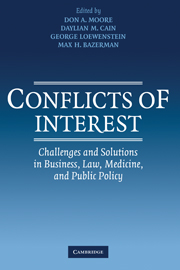Book contents
- Frontmatter
- Contents
- List of Contributors
- Acknowledgments
- Introduction
- PART ONE BUSINESS
- 1 Managing Conflicts of Interest within Organizations: Does Activating Social Values Change the Impact of Self-Interest on Behavior?
- 2 Commentary: On Tyler's “Managing Conflicts of Interest within Organizations”
- 3 A Review of Experimental and Archival Conflicts-of-Interest Research in Auditing
- 4 Commentary: Conflicts of Interest in Accounting
- 5 Bounded Ethicality as a Psychological Barrier to Recognizing Conflicts of Interest
- 6 Commentary: Bounded Ethicality and Conflicts of Interest
- 7 Coming Clean but Playing Dirtier: The Shortcomings of Disclosure as a Solution to Conflicts of Interest
- 8 Commentary: Psychologically Naive Assumptions about the Perils of Conflicts of Interest
- PART TWO MEDICINE
- PART THREE LAW
- PART FOUR PUBLIC POLICY
- Index
- References
6 - Commentary: Bounded Ethicality and Conflicts of Interest
Published online by Cambridge University Press: 04 August 2010
- Frontmatter
- Contents
- List of Contributors
- Acknowledgments
- Introduction
- PART ONE BUSINESS
- 1 Managing Conflicts of Interest within Organizations: Does Activating Social Values Change the Impact of Self-Interest on Behavior?
- 2 Commentary: On Tyler's “Managing Conflicts of Interest within Organizations”
- 3 A Review of Experimental and Archival Conflicts-of-Interest Research in Auditing
- 4 Commentary: Conflicts of Interest in Accounting
- 5 Bounded Ethicality as a Psychological Barrier to Recognizing Conflicts of Interest
- 6 Commentary: Bounded Ethicality and Conflicts of Interest
- 7 Coming Clean but Playing Dirtier: The Shortcomings of Disclosure as a Solution to Conflicts of Interest
- 8 Commentary: Psychologically Naive Assumptions about the Perils of Conflicts of Interest
- PART TWO MEDICINE
- PART THREE LAW
- PART FOUR PUBLIC POLICY
- Index
- References
Summary
The focus on psychological processes, and their corresponding influence on unethical behavior, is incredibly important. Chugh, Bazerman, and Banaji intuitively note that these “unchecked processes” – including inflated perceptions of one's morality, competency, and deservingness – act as forces against objective assessments in situations involving conflicts of interest. The end result, they argue, is that individuals may not only be unaware of conflicts of interest but also that they are acting against professional and normative standards when faced with such conflicts.
This chapter is an essential component of a growing body of evidence that recognizes the human tendency to reconstruct ethical dilemmas so as to avoid any tension experienced by the individuals. Individuals, for example, are argued to engage in “ethical fading,” a process that removes the difficult moral issues from a given problem or situation, hence increasing unethical behavior (Tenbrunsel & Messick, 2004). From this perspective, such unethical Such fading means that ethics training or more ethical codes of conduct wouldn't have prevented well-known scandals such as Enron and WorldCom. behavior occurs not because people are morally uneducated but, rather, because they do not see the “ethical” in the decision. Self-deception is identified to be at the root of this problem. Such deception involves avoidance of the truth, the lies that we tell to, and the secrets we keep from, ourselves (Bok, 1989). As illustrated later, the self-deception is insidious and therefore problematic:
This practice is common, normal, and accepted as constant and pervasive in individuals' lives. We are creative narrators of stories that tend to allow us to do what we want and that justify what we have done. […]
Information
- Type
- Chapter
- Information
- Conflicts of InterestChallenges and Solutions in Business, Law, Medicine, and Public Policy, pp. 96 - 103Publisher: Cambridge University PressPrint publication year: 2005
References
Accessibility standard: Unknown
Why this information is here
This section outlines the accessibility features of this content - including support for screen readers, full keyboard navigation and high-contrast display options. This may not be relevant for you.Accessibility Information
- 9
- Cited by
